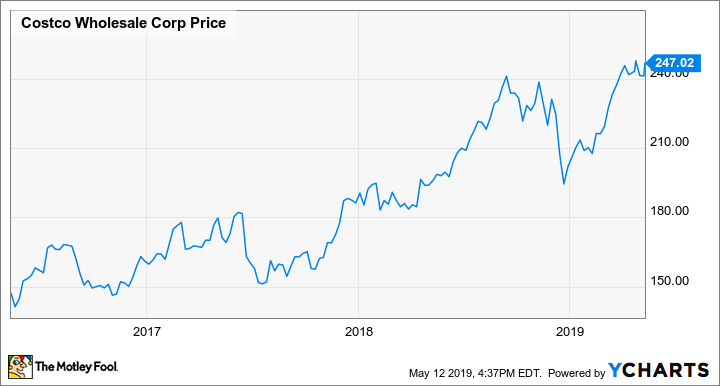Shares of Costco Wholesale (COST -1.78%) dipped briefly last month after the discount warehouse club operator reported somewhat disappointing sales results for the retail month of March. This made some investors worry that Costco's sales momentum could be dissipating.
However, the company reassured investors about its sales trajectory last Wednesday, reporting strong April sales. This enabled Costco shares to gain ground last week, even as the broader market fell 2%. Indeed, Costco stock ended the week within 1% of its all-time high.
Costco Stock Performance, data by YCharts.
Costco bounces back after a modest growth slowdown
Costco posted a 5.9% comp sales increase in March, excluding the impact of foreign currency fluctuations, gasoline price inflation, and the impact of new revenue recognition rules. (All comp sales results discussed here incorporate these adjustments.) However, the company had one extra sales day during the month, due to the timing of Easter. Management estimated that this boosted comp sales by between 1 and 1.5 percentage points.
Thus, Costco's comp sales growth would have been a little below 5% without the Easter shift. Most retailers would be delighted with a result like that, but Costco shareholders were hoping for more. In the first half of fiscal 2019, comp sales rose about 7% year over year.
In April, Costco had one fewer selling day than in the prior-year period, again because of the timing of Easter. This headwind reduced comp sales growth by 1.5 to 2 percentage points, which made the company's 5.2% comp quite impressive. Traffic rose 3.3% year over year, including a 3.5% increase in the U.S., driving most of Costco's comp sales gain.

Costco posted strong comp sales growth last month. Image source: Costco Wholesale.
Adjusted for the Easter shift, Costco returned to its previous sales trend, with roughly 7% comp sales growth last month. And taking March and April together -- which eliminates the impact of Easter -- Costco achieved a solid 5.6% comp sales gain, consisting of a 5.6% increase in the U.S., 4.6% growth in Canada, and a 6.7% jump in its other international markets.
Consistent performance across the company
In some months, certain business lines have driven the bulk of Costco's comp sales growth. However, that wasn't really the case in April. Costco reported mid-single-digit growth for all four of the broad merchandise classifications it reports: food and sundries, hardlines, softlines, and fresh foods.
Within these groupings, the standout merchandise categories included toys, big-ticket items, housewares, and home furnishings. This shows that Costco is continuing to capitalize on the bankruptcies of competitors in these categories like Toys R Us and Sears, while also gaining market share from struggling retailers like J.C. Penney, Pier 1 Imports, and Bed Bath & Beyond.
Costco is unstoppable
After a strong start to 2019, Costco stock is quite expensive. Costco shares now trade for about 31 times the company's projected earnings for fiscal 2019.
This means that Costco stock may have limited upside over the next year or two. Nevertheless, it remains a solid stock for long-term investors to consider. Low prices have allowed the warehouse club giant to build up a massive base of loyal members -- the renewal rate exceeds 90% in the U.S. and Canada and is still rising -- who are steadily increasing their spending at Costco over time.
The retail apocalypse is only adding to Costco's sales momentum. The growth of e-commerce isn't much of a threat, given that many of the items Costco sells are too bulky to ship effectively. Meanwhile, a slew of competitors are being forced to retrench (or even being driven out of business), creating ample opportunities for market share gains.
Thus, while Costco stock probably isn't going to deliver quick gains, it still could build long-term wealth for shareholders over the next decade and beyond.






